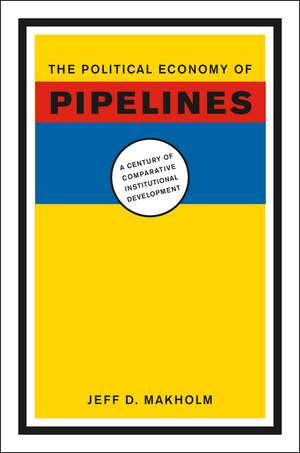The Political Economy of Pipelines: A Century of Comparative Institutional Development
Autor Jeff D. Makholmen Limba Engleză Hardback – 15 apr 2012
With global demand for energy poised to increase by more than half in the next three decades, the supply of safe, reliable, and reasonably priced gas and oil will continue to be of fundamental importance to modern economies. Central to this supply are the pipelines that transport this energy. And while the fundamental economics of the major pipeline networks are the same, the differences in their ownership, commercial development, and operation can provide insight into the workings of market institutions in various nations.
Drawing on a century of the world’s experience with gas and oil pipelines, this book illustrates the importance of economics in explaining the evolution of pipeline politics in various countries. It demonstrates that institutional differences influence ownership and regulation, while rents and consumer pricing depend on the size and diversity of existing markets, the depth of regulatory institutions, and the historical structure of the pipeline businesses themselves. The history of pipelines is also rife with social conflict, and Makholm explains how and when institutions in a variety of countries have controlled pipeline behavior—either through economic regulation or government ownership—in the public interest.
Preț: 481.03 lei
Preț vechi: 624.71 lei
-23% Nou
Puncte Express: 722
Preț estimativ în valută:
92.05€ • 96.35$ • 76.61£
92.05€ • 96.35$ • 76.61£
Carte tipărită la comandă
Livrare economică 31 martie-14 aprilie
Preluare comenzi: 021 569.72.76
Specificații
ISBN-13: 9780226502106
ISBN-10: 0226502104
Pagini: 288
Ilustrații: 3 halftones, 5 line drawings
Dimensiuni: 152 x 229 x 25 mm
Greutate: 0.51 kg
Editura: University of Chicago Press
Colecția University of Chicago Press
ISBN-10: 0226502104
Pagini: 288
Ilustrații: 3 halftones, 5 line drawings
Dimensiuni: 152 x 229 x 25 mm
Greutate: 0.51 kg
Editura: University of Chicago Press
Colecția University of Chicago Press
Notă biografică
Jeff D. Makholm is an economist with National Economic Research Associates, an international firm providing economic analysis to corporations, governments, regulatory agencies, and special interest groups. He is the author of The Distribution and Pricing of Sichuan Natural Gas.
Cuprins
Preface
Chapter 1. The New Institutional Economics and Pipeline Transport
Chapter 2. Existing Pipeline Studies and Private Pipeline Capital
Chapter 3. The Economics of Production Cost: Pipelines as Natural Monopolies
Chapter 4. Regulating Pipelines as a Response to Monopoly
Chapter 5. The Essential Contributions of the New Institutional Economics
Chapter 6. Transacting with Common Carriage: The Oil Pipeline Regulations of 1906
Chapter 7. Transacting with Private Carriage: The Gas Pipeline Regulations of 1938
Chapter 8. The Competitive Potential for the World’s Pipeline Systems
Chapter 9. Making Sense of Pipelines: The Lenses of the New Institutional Economics
Chapter 2. Existing Pipeline Studies and Private Pipeline Capital
Chapter 3. The Economics of Production Cost: Pipelines as Natural Monopolies
Chapter 4. Regulating Pipelines as a Response to Monopoly
Chapter 5. The Essential Contributions of the New Institutional Economics
Chapter 6. Transacting with Common Carriage: The Oil Pipeline Regulations of 1906
Chapter 7. Transacting with Private Carriage: The Gas Pipeline Regulations of 1938
Chapter 8. The Competitive Potential for the World’s Pipeline Systems
Chapter 9. Making Sense of Pipelines: The Lenses of the New Institutional Economics
Notes
Bibliography
Recenzii
“More than a story of pipeline markets and regulation, this book also offers a rich study of how asset specificity, non-deployable capital, and high up-front capital costs affect market development, regulation, pricing, and entry. Makholm takes what would otherwise be a pretty unexceptional industry—pipeline transport—and makes it of interest to a broader audience, especially those concerned with the new institutional economics.”
“This book comes at the right moment. It blends insights into the technology, economics, and institutional development of an industry that has long been ignored in the US and elsewhere. With the ongoing transformation of the energy sector, The Political Economy of Pipelines is a must-read for anyone interested in the natural gas and other pipeline industries as well as those interested in the evolution of economic and institutional thought. —Christian von Hirschhausen, Berlin University of Technology
“Both invaluable and disheartening, The Political Economy of Pipelines helps readers to understand why the European gas market does not work—not because reforms have not gone far enough, but because they are fundamentally flawed. In place of the current patchwork of nationally regulated pipeline monopolies, Europe must put in place institutions allowing the emergence and evolution of a competitive market for gas transportation capacity rights that ignores national borders. As Jeff D. Makholm’s institutional economic analysis confirms, such a shift is almost as unlikely as it is needed.”—Pierre Noël, University of Cambridge
How did different regulatory frameworks arise for gas pipelines that have largely similar infrastructures? And why are US gas pipelines the only successful example of a competitive infrastructure market based on Coasian bargaining? Since neoclassical theory is not able to provide adequate answers to these questions or optimal regulatory solutions, Jeff D. Makholm employs the New Institutional Economics, utilizing the work of Oliver E. Williamson to offer a convincing discussion of how regulatory frameworks have developed and possible implications for future regulatory design.
“Elegantly and concisely written, [The Political Economy of Pipelines] is in part an essay on economic theory, in part a contribution to comparative economic and business history, and in part a programmatic statement for industry reform. Business and economic historians will find it highly useful, especially in relation to the sections on economic theory and pipelines, which are lucid and insightful.”













